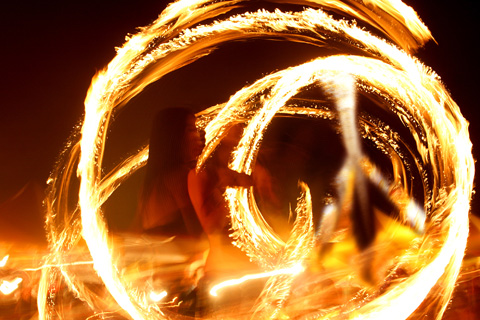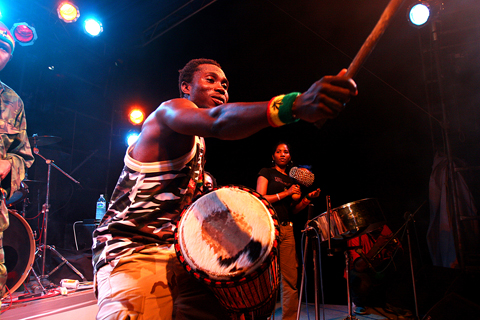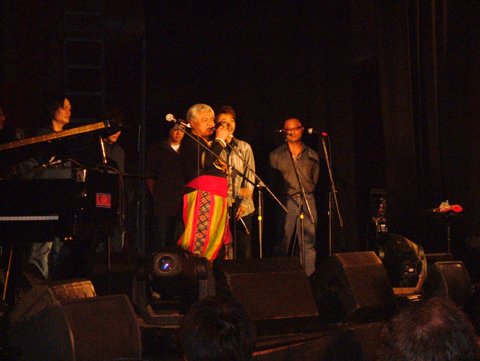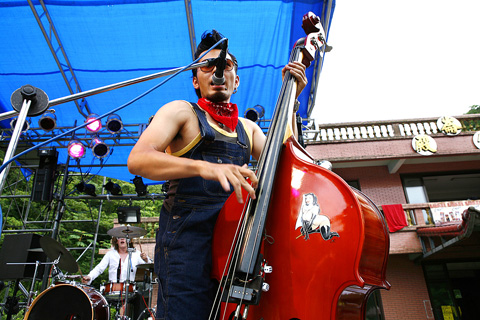In an open field, 100 or so people join hands in a circle, spin faster and faster, then break off to dance as drums begin to play.
The peace circle might sound like “just some hippie thing,” but Sean Wratt, the organizer of Taiwan Peace Festival, a three-day annual music festival held at the Kunlun Herb Gardens (崑崙藥用植物園) in Taoyuan County (桃園縣), says it’s something more. “It has a life of its own … , it brings us back to our childhood, as opposed to immaturity. … By holding hands, you have an instant connection to everybody.”
Potential festivalgoers need not fear being strong-armed into feeling the love, though, as there’s no obligation to join the circle. In previous years, many attendees were content to watch proceedings and drink beer. “It’s not for everybody,” acknowledges long-term Taiwan resident and festival organizer Lynn Miles.

PHOTO: COURTESY OF KLOIE PICOT
This year’s edition, which begins next Friday, focuses on Aboriginal culture and has an expanded lineup. In addition to the 50 bands and DJs slated to perform, there is a documentary film festival and expanded outdoors activities.
Aboriginal folk singer Kimbo Hu (胡德夫), a highly anticipated act on the evening of June 14, makes an appearance at Peacefest every year. The Puyuma-Paiwan singer performs what he calls the “Haiyan Blues,” referring to his Aboriginal roots. Another Aboriginal performer the same evening is Biung (王宏恩), whose songs about his Bunun culture earned him a Golden Melody Award in 2001. The Samba Drummers, a group of Atayal students from a Taoyuan County elementary school, will lead the peace circle this year.
The indigenous theme goes beyond the music. Two guest speakers will give talks in the early afternoon of June 14. Activist and teacher Obay a Awi (趙一先) will speak about how the Saisiyat Tribe achieved autonomy in Taiwan. Peter Hsu (眭澔平), a well-known travel writer and historian, will talk about how indigenous peoples across the world greet strangers. Hsu will also hold a question-and-answer session. (As of press time, the times for the talks had yet to be announced. Visit the festival’s Web site for schedule updates).

PHOTO: COURTESY OF KLOIE PICOT
If you want a break from the bands, a mini-film festival runs throughout the weekend. Most of the 15 films to be screened are social documentaries that cover politics, the environment and activism. Notable films include War on Democracy by Australian journalist John Pilger and The Corporation, a Canadian production about the role of the corporation in modern society.
The purpose of having the film fest is “to get some dialogue going,” says co-organizer Christian Kohle. The films will be shown in an indoor, air-conditioned space at the Kunlun Gardens visitor center, and in case you miss a film, the Peacefest media tent will also be passing out free copies of the movies.
Visitors to this year’s festival will notice more campground space. The organizers have arranged to use the entire grounds of the Kunlun Gardens — instead of having the camping area crowded around the main stage and field, campers have three sites to choose from this year.

PHOTO: COURTESY OF KLOIE PICOT
The designated campsites can accommodate up to a total of 120 tents and are set away from the main stage, which organizers hope will encourage festivalgoers to walk around more and enjoy the natural settings, says Wratt.
The organizers said this year’s festival is more environmentally friendly. They have cleaned up the campsites, and no cars will be allowed past the visitor’s center. Bottles have been a problem in the past, so this year the festival is only selling canned drinks. Visitors are encouraged not to bring bottled beverages. Peacefest also asks visitors to use the separate receptacles on hand for trash and recyclables. The trash is to be separated by volunteers and handed over to the local government for processing, while the recyclables are given to the local community, which sells them to recycling firms.
Peacefest started as an anti-war event but has moved on to supporting charities. All proceeds are to be donated to the following organizations: Taiwan International Workers Association; Compassion International Taiwan; Basic Human Needs; Transasia Sisters; and Adopt-A-Minefield. Representatives from these organizations will have information tents set up near the main stage. Peacefest organizers say they will post an itemized list of all operational costs and profits on the festival’s Web site.

PHOTO: COURTESY OF KLOIE PICOT
The event is run entirely by a network of volunteers, which makes Peacefest a “process” and not just one weekend, says Miles.
Wratt hopes the charitable spirit of Peacefest will spread. “Hopefully, it will inspire people to do things themselves throughout the year, not just spend money at a bar,” he said.
BANDS
6/13 (Friday)
7pm Open Jam
8pm Dr Reniculous Lipz (hip-hop)
8:50pm Silent Toads (rock)
9:40pm The Admissionaries (rock)
10:30pm Monkey Pilot (rock)
11:20pm 88 Balaz (88芭樂仔, punk rock)
12:10am New Hong Kong Hair City (funk)
1am Leo 37 (hip-hop)
DJs
1:30am Koala (Taiwan)
3am Kerlivin aka Dragon (Taiwan)
5am Control Z (South Africa)
6:30am Mark aka Hydraglyph (South Africa)
8:30am Xemi Tone (South Africa)
10am Lazy Daze (Australia)
6/14 (Saturday)
12pm Three Day Bender (electric blues)
12:50pm Brian Funshine (folk)
1:40pm Black Lung Inner City Choir (folk rock)
2:30pm The Rising Hedons (blues rock)
3:20pm Hide Tide (reggae)
4:10pm David Chen and the Muddy Basin Ramblers (jug band, blues)
5pm Militant Hippi (hip-hop and fusion)
5:50pm The Dream Community’s Samba
Drumming Group
6:10pm Peace Circle — Dijiboom
6:50pm Kimbo Hu (胡德夫) (Haiyan blues)
7:40pm Biung (王宏恩) and Dijiboom (folk)
8:30pm Mister Green and Highway 9
(九號公路)(rock)
9:20pm Big Brass Balls (rock)
10:10pm Public Radio (roots, rock, reggae)
11pm The Money Shot Horns (funk, R ’n’ B)
11:50pm Skaraoke (ska)
12:40am Moss (psychedelic rock)
1:20am Consider the Meek (punk)
2am Divebomb (punk)
2:40am Blood Orange (punk)
3:20am THC (hip-hop)
DJs
3:50am Stereo:Types (hip-hop)
5:20am Desoto (dub, reggae, downtempo)
6:50am Sneaky Steve (eclectic downtempo)
8:20am Viba (chillout/live PA)
6/15 (Sunday)
10am Tyler Dakin and Friends (roots and folk)
10:40am Sujer (fingerstyle guitar)
11:20am Alisons’ Army (folk)
12am 2 Acres Plowed (country)
12:40pm Kobayashi Ryujiro and Furai
(Japanese folk)
1:30pm Taimaica Sound System (dub reggae)
2:20pm Native Space (tribal trip bop)
3:10pm Pan Africana (African rhythm)
4pm Red-I and the Riddim Outlawz (reggae)
DOCUMENTARY FILMS
6/13 (Friday)
7pm Who Killed the Electric Car
Why the auto industry stopped producing electric cars
10pm The Corporation
A look at one of the dominant institutions of modern times
11pm Zeitgeist
A compilation of documentaries on historical deceptions in religion, politics, and finance
1am War on Democracy
Australian writer John Pilger presents declassified information on CIA involvement in overthrow of democratically elected governments over past 50 years
3am Baraka
A comparison of the old and new world, presented in a visual production by Ron Fricke
6/14 (Saturday)
11am Terrostorm
History of state-sponsored terrorism and dissent
1pm Holes in Heaven
A film about a controversial high frequency radio transmitter operated by the US Navy and Air Force in Alaska
3pm The Great Global Warming Swindle
A film cautioning against blaming all environmental problems on carbon
5pm The Great Global Warming — A Rebuttal
A dissection of the Great Global Warming Swindle, and how mainstream media frames environmental issues
6pm America: Freedom to Fascism
A libertarian’s history of finance in the US
8pm The Money Masters
A three-hour film on the history of money
11pm Zeitgeist
1am What the Bleep — Down the Rabbit Hole
A look at controversial ideas on the role of consciousness in quantum theory
3am The Wall
Pink Floyd’s musical classic
6/15 (Sunday)
9am Baraka
11pm The World According to Monsanto
French documentary on the controversial agricultural company
1am Orwell Rolls in his Grave
Examines control and role of the modern media
3pm Loose Change — Final Cut
Details conspiracy theory on the Sept. 11 attacks

When Taiwan was battered by storms this summer, the only crumb of comfort I could take was knowing that some advice I’d drafted several weeks earlier had been correct. Regarding the Southern Cross-Island Highway (南橫公路), a spectacular high-elevation route connecting Taiwan’s southwest with the country’s southeast, I’d written: “The precarious existence of this road cannot be overstated; those hoping to drive or ride all the way across should have a backup plan.” As this article was going to press, the middle section of the highway, between Meishankou (梅山口) in Kaohsiung and Siangyang (向陽) in Taitung County, was still closed to outsiders

President William Lai (賴清德) has championed Taiwan as an “AI Island” — an artificial intelligence (AI) hub powering the global tech economy. But without major shifts in talent, funding and strategic direction, this vision risks becoming a static fortress: indispensable, yet immobile and vulnerable. It’s time to reframe Taiwan’s ambition. Time to move from a resource-rich AI island to an AI Armada. Why change metaphors? Because choosing the right metaphor shapes both understanding and strategy. The “AI Island” frames our national ambition as a static fortress that, while valuable, is still vulnerable and reactive. Shifting our metaphor to an “AI Armada”

US President Donald Trump may have hoped for an impromptu talk with his old friend Kim Jong-un during a recent trip to Asia, but analysts say the increasingly emboldened North Korean despot had few good reasons to join the photo-op. Trump sent repeated overtures to Kim during his barnstorming tour of Asia, saying he was “100 percent” open to a meeting and even bucking decades of US policy by conceding that North Korea was “sort of a nuclear power.” But Pyongyang kept mum on the invitation, instead firing off missiles and sending its foreign minister to Russia and Belarus, with whom it

The Chinese Communist Party (CCP) has a dystopian, radical and dangerous conception of itself. Few are aware of this very fundamental difference between how they view power and how the rest of the world does. Even those of us who have lived in China sometimes fall back into the trap of viewing it through the lens of the power relationships common throughout the rest of the world, instead of understanding the CCP as it conceives of itself. Broadly speaking, the concepts of the people, race, culture, civilization, nation, government and religion are separate, though often overlapping and intertwined. A government